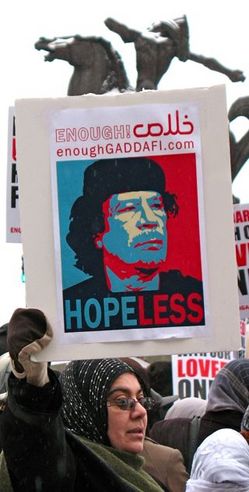Our Values: Is Libya hopeless? More violence coming?

Anti-Gaddafi protest in Chicago borrows from the Obama poster to make a much different point.
Photo courtesy of Wikimedia Commons
Are you worried about the next Libya? About another failed state where we will feel a moral obligation to intervene militarily?
The popular revolutions in Tunisia and Egypt were relatively peaceful. They didn’t produce grave and serious injustices on a scale that warranted intervention. Libya did. The fates of Yemen and Bahrain are still to be determined.
One hopes that Tunisia and Egypt are the peaceful rule and Libya is the violent exception. If not, we may face more Libyas. Where? There are plenty of candidates.
Back in February, The Economist tried its hand at divination, assessing the likelihood that various Arab nations might experience a popular revolt. The accuracy of their predictions is uncanny.
Yemen topped the Economist list as most unstable, followed by Libya and Egypt in the second and third spots. Also ranked high were Syria, Iraq, Oman, Mauritania, and Saudi Arabia, Algeria and Jordan. Tunisia was in the middle of the rankings, so it wasn’t predicted to be the first mover it was. Bahrain might be the biggest surprise. It was ranked relatively low among the 17 nations listed.
The rankings factored in years a current regime was in power, percent population under 25, GDP per person, adult literacy, percent Internet users and relative levels of democracy, corruption and press freedom.
(Here’s a link to their interactive ranking system, where you can try your hand at prediction by assigning different weights to the factors.)
Revolution continues to spread in the Middle East. What’s next?
Dr. Wayne E. Baker is a sociologist on the faculty of the University of Michigan Ross School of Business. Baker blogs daily at Our Values and can be reached at ourvaluesproject@gmail.com.


Comments
REBBAPRAGADA
Sat, Mar 26, 2011 : 4:58 p.m.
In Libya, we are not seeking peaceful transition of power. A fundamental aspect of democracy and democratic governance would be that of a peaceful transition of power. We are actively engaged in promoting the use of violence and warfare to obtain the goal of a regime change and then establish democratic rule in future. As Gandhiji had often claimed, the goals do not justify the means that we employ. These people will continue to depend on the use of force, and violence and in future would use violence and warfare to resolve conflicts and to settle disputes. This involvement in Libya using military force is illegal, immoral, and is unwise.
bedrog
Fri, Mar 25, 2011 : 7:58 p.m.
p.s...the comment in the original article about how benignly affairs in Tunisia and Egypt have "turned out" is WAY premature, per a first- page article in the NY TIMES today on how in Egypt it is indeed the Muslim Brotherhood that is emerging as the key non- military player in the country, with the nice , westernized 'facebook' revolutionaries being increasingly marginalized.
bedrog
Fri, Mar 25, 2011 : 7:53 p.m.
Prior to Qaddafi Libya's ruling house originated in the 'sanusi' sufi movement, based among Libya's nomadic bedouin tribes, that had opposed Italian imperialism with guerilla tactics from the late 19th century through Mussolini. That religiously fundamentalist movement in turn was corrupted by Libya's western- developed oil wealth ,leaving Qaddafi the role as "reformist to true islamic values , comin atcha from the purity of the desert wastes" ( his family were shepherds too). And that turned into a catastrophe pretty early in his reign ( per Lockerbie and other complete lunatic moves on his part). If anything remotely good comes out of this current mess in the way of a secular non rabid democracy, it'll be against all informed expectations and the tides of Libya's ( and general Islamic- world ) history. But here's hopin'.
REBBAPRAGADA
Fri, Mar 25, 2011 : 7:13 p.m.
United States desires peace and stability in countries like Saudi Arabia, Sultanate of Oman, and Bahrain as these countries are actively involved in supporting the U.S. military operations in that region. Jordan is also a key ally. What would United States do to solve the problems of people of Syria, and Yemen? U.S. could not establish peace and stability in Iraq and Afghanistan in spite of its heavy involvement. It is irrational to take up a new burden while the previous assignments in the region have not finished and the outcome is still uncertain.